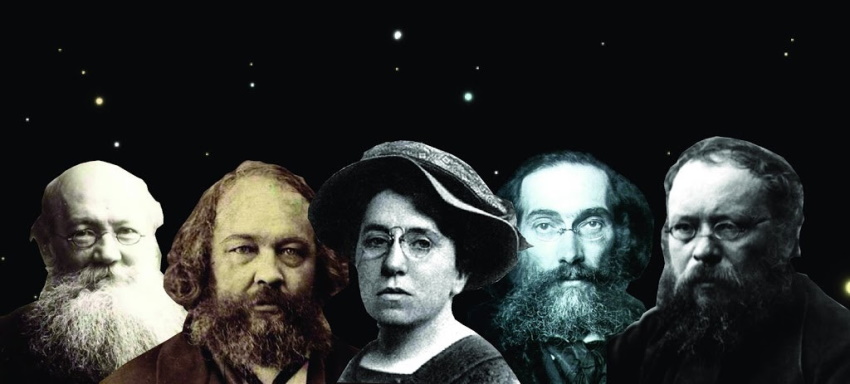Anarchy = Natural Law
Anarchy = Natural Law
This, ultimately, is what anarchists mean by freedom.
by Paul Cudenec
sourced from NevermoreMedia
originally published July 18, 2013

Below is an excerpt from The Anarchist Revelation. It’s taken from the chapter called Anarchy is Life. Pictured here, from left, are anarchist thinkers Peter Kropotkin, Michael Bakunin, Emma Goldman, Gustav Landauer and Pierre-Joseph Proudhon.
For an anarchist, the tender green shoot of each new-born child, the precious potential of each wonderfully unique and beautiful human being, is blocked, crushed, destroyed by the steel toe-capped boots of capitalism.
Emma Goldman says that the health of society could be measured by a person’s “individuality and the extent to which it is free to have its being, to grow and expand unhindered by invasive and coercive authority”, and Gustav Landauer writes that “anarchism’s lone objective is to end the fight of men against men and to unite humanity so that each individual can unfold his natural potential without obstruction”.
This, ultimately, is what anarchists mean by freedom. The freedom to be what we are meant to be, to become what we were born and destined by nature to become, if our ontogeny had not been thwarted and distorted.
Left to our own devices, freed from the control of the slave-masters, we individuals would co-operate and combine in the way that we were intended to, in the same way as our fellow creatures, plants, insects, fungi and microbes.
This is the basis of Peter Kropotkin’s classic argument for a society free of state, the harmonious natural order of which humans – and their relations with each other – form part: “The mutual-aid tendency in man has so remote an origin, and is so deeply interwoven with all the past evolution of the human race, that it has been maintained by mankind up to the present time, notwithstanding all vicissitudes of history”.
As Michael Bakunin says: “Nature, notwithstanding the inexhaustible wealth and variety of beings of which it is constituted, does not by any means present chaos, but instead a magnificently organized world wherein every part is logically correlated to all the other parts”.
Natural laws – these are the basis of the anarchist vision of a proper society and the reason why we reject the man-made variety as imposters and destroyers of all that is good and true and real.
Bakunin, that fiery messiah of disobedience, explains how these natural laws are of a kind he has no hesitation in bowing to: “Yes, we are unconditionally the slaves of these laws. But in such slavery there is no humiliation, or rather it is not slavery at all. For slavery presupposes the existence of an external master, a legislator standing above those whom he commands, while those laws are not extrinsic in relation to us: they are inherent in us, they constitute our nature, our whole being, physically, intellectually and morally. And it is only through those laws that we live, breathe, act, think and will. Without them we would be nothing, we simply would not exist”.
Natural laws are the interwoven and infinitely complex limbs of a living community, a vital entity that is the only form of “authority” that anarchists can respect, with the difference between a governmental society and an anarchic society being, as George Woodcock says, “the difference between a structure and an organism”.
Rejecting the pitiful idea that we come into this world devoid of purpose and principle, helplessly amoral blank sheets of living paper on which the state, in its wisdom, must write down the rules by which it demands we should live, anarchists know that inherent laws have already laid down a sense of justice in our souls.
“An integral part of the collective existence, man feels his dignity at the same time in himself and in others, and thus carries in his heart the principle of a morality superior to himself,” writes Pierre-Joseph Proudhon.
“This principle does not come to him from outside; it is secreted within him, it is immanent. It constitutes his essence, the essence of society itself. It is the true form of the human spirit, a form which takes shape and grows towards perfection only by the relationship that every day gives birth to social life. Justice, in other words, exists in us like love, like notions of beauty, of utility, of truth, like all our powers and faculties”.
It is precisely because we already know true justice – in our blood, in our bones, in our guts, in our dreams – that anarchists are so revolted by the sick parody that is served up to us by the bigwigs of the state. Our innate sense of right and wrong is mortally offended and the pressure of a true justice re-pressed, of a natural authority denied, of inherent laws smothered, builds up in our spirits – individually and en masse, consciously and unconsciously – and becomes the force behind the need for revolution.
This force becomes a living entity itself – not the passive, patient entity that would animate human societies in times when all was going as it should, but an active, dynamic entity that has formed itself with the one purpose of breaking through the obstruction to life that it finds blocking nature’s path.
For Landauer, this revolutionary entity becomes a source of cohesion, purpose and love – “a spiritual pool” – for a humanity stranded in a desolate and despotic age: “It is in revolution’s fire, in its enthusiasm, its brotherhood, its aggressiveness that the image and the feeling of positive unification awakens; a unification that comes through a connecting quality: love as force”.
cover image credit: InspiredImages / pixabay